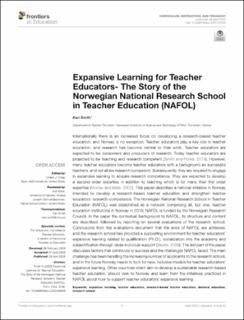Expansive Learning for Teacher Educators- The Story of the Norwegian National Research School in Teacher Education (NAFOL)
Peer reviewed, Journal article
Published version

Åpne
Permanent lenke
https://hdl.handle.net/11250/2653139Utgivelsesdato
2020Metadata
Vis full innførselSamlinger
- Institutt for lærerutdanning [3818]
- Publikasjoner fra CRIStin - NTNU [38518]
Originalversjon
10.3389/feduc.2020.00043Sammendrag
Internationally there is an increased focus on developing a research-based teacher education, and Norway is no exception. Teacher educators play a key role in teacher education, and research has become central to their work. Teacher educators are expected to be consumers and producers of research. Today teacher educators are projected to be teaching and research competent (Smith and Flores, 2019). However, many teacher educators become teacher educators with a background as successful teachers, and not all are research competent. Subsequently, they are required to engage in expansive learning to acquire research competence. They are expected to develop a second order expertise in addition to teaching which is for many their first order expertise (Murray and Male, 2005). This paper describes a national initiative in Norway intended to develop a research-based teacher education and strengthen teacher educators’ research competence. The Norwegian National Research School in Teacher Education (NAFOL) was established as a network comprising all, but one, teacher education institutions in Norway in 2010. NAFOL is funded by the Norwegian Research Council. In the paper the contextual background to NAFOL, its structure and content are described, followed by reporting on several evaluations of the research school. Conclusions from the evaluations document that the aims of NAFOL are achieved, and the research school has provided a supporting environment for teacher educators’ expansive learning related to qualification (Ph.D.), socialization into the academy and subjectification through close individual support (Biesta, 2009). The last part of the paper discusses factors that contribute to success and the challenges NAFOL faced. The main challenge has been handling the increasing number of applicants to the research school, and in the future Norway needs to look for new, inclusive models for teacher educators’ expansive learning. Other countries which aim to develop a sustainable research-based teacher education, should look to Norway and learn from the initiatives practiced in NAFOL about how to support teacher educators’ expansive learning.
